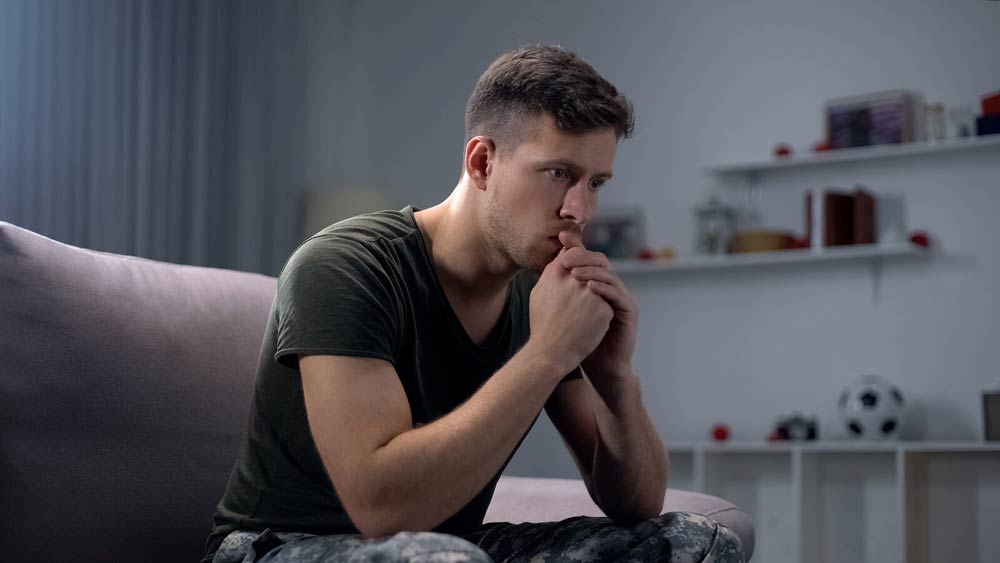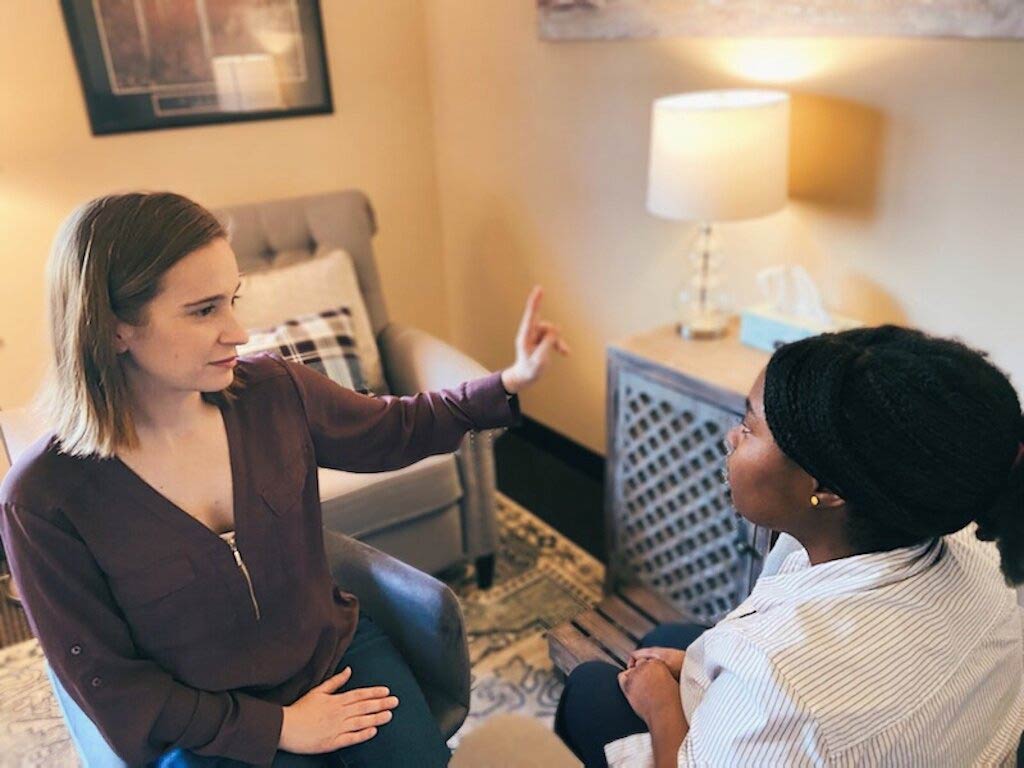Trauma Therapy: Reclaim Your Life with Expert PTSD Treatment
- A trauma has rocked your life in a way you could have never imagined.
- The feelings of shock, fear, anger, shame and despair are like nothing you’ve ever experienced.
- How did you get here? Why did this happen to you?
- Will things ever feel “normal” again?
You want to move on. In fact, you’ve tried just pretending the trauma never happened. But it keeps creeping back up. You feel triggered by little things in your life and thoughts or memories intrude when you least expect them. Perhaps you have trouble sleeping, are now suffering from depression or live in constant fear.
Living with trauma can feel overwhelming, but you don’t have to face it alone. At The Relationship Therapy Center, we offer compassionate, evidence-based trauma therapy to help you heal and rediscover hope. Whether you’re struggling with PTSD, relational trauma, or the aftermath of a distressing event, our experienced therapists are here to guide you on your journey to recovery. Let us help you build resilience, restore your sense of safety, and embrace a brighter future.
Trauma Comes in Many Forms; Therapy Can Help. Offering Online EMDR
When people hear the word “trauma” they often think of active duty combat or a sexual assault. Perhaps you’ve wondered if what you went through was “bad enough” to count as trauma. The truth is that a wide range of things can be interpreted by the brain as trauma. There’s no specific measuring stick for what “counts.” Trauma is your psychological or emotional response to any event that is very distressing or disturbing.
Common Sources of Trauma
- An affair or betrayal
- Physical or sexual assault
- Neglect or abuse by caregivers or other adults in childhood
- Chronic illness, pain, or birth trauma
- Sudden loss of a loved one
- A life threatening event
- PTSD from combat or other violence

You May Feel Stuck or Lost After Trauma
It’s totally normal after a trauma to feel stuck. Maybe, you feel like you are just watching your life from the outside. Or, you might be afraid of relationships or feel like you need to hide from others in order to protect yourself. You might experience depression, frustration or resentment. After trauma, you may feel alone and think no one could possibly understand what you’re going through. But, we want to let you know that our caring therapists here for you. We know how trauma can affect you, and want to help you heal.
The Ripple Effects of Trauma: Common Experiences
- Negative changes in mood and thoughts,
- “I am bad,” “No one can be trusted.”
- Anger, guilt, and shame related to the trauma
- Detachment from your life and the people in it
- Negative changes in behavior,
- irritability, angry outbursts, self-destructive behavior, hyper-vigilance, and magnified startle responses
- Problems with concentration and sleep
- Substance abuse after the trauma
What is Relational Trauma? Why Does It Hurt So Much?
Relational trauma is physical or emotional trauma in relationships. This includes betrayals and affairs.
After an affair, you might feel angry, hurt and confused. Maybe, you are constantly reliving the betrayal and you feel bitter about the way you were treated. You find yourself wanting revenge. Sometimes, you even hate your partner. But, you also want them and the relationship back to the way they were before everything fell apart.
These feelings of resentment and loss of trust are totally understandable! Especially, if you still have to deal with the person in a relationship, co-parenting, or professional setting.
When Individual Trauma Impacts Your Relationship
In a couple, individual PTSD can show up as a partner not being able to accept affection. They may seem numb and emotionally disconnected. This can come across as being overly controlling or really compliant. A traumatized partner may have angry outbursts for seemingly no reason, taking out their trauma out on you. After trauma, your partner might not really be invested in the future anymore. Most people experience loss of trust in anyone and feeling like the world is not safe.
Of course, this can have a major negative impact on your relationship. So, in therapy, we teach you both the skills to work through the trauma together. You can be emotionally attune to your partner with PTSD and make them feel safe again. In fact, you can help with their healing. We will help you build connection and work on processing the issue so you finally feel like a team. Finally, we will learn about their triggers to help avoid and work through them together.

Trauma Treatment at The Relationship Therapy Center
At The Relationship Therapy Center, we understand that healing from trauma is a journey. Our compassionate approach combines evidence-based therapies with personalized care to help you reclaim your life and find peace.
Our caring therapists use evidence-based trauma therapy to help you heal from trauma in person at our counseling center in Roseville, CA and Fair Oaks, CA and online. In therapy, you will learn new tools of emotional regulation, mindfulness and relaxation. Your trauma therapist will help you learn coping skills, lower your anxiety and boost your ability to manage stress.
Technically, counseling for trauma can look different for each individual and couple, depending on what you and your therapist decide is best. In general, we will work on processing and restructuring the event. There might be some work on overcoming shame by building self compassion. Physically, we may spend some time teaching your nervous system more effective ways to relax and release tension you may not even know you are holding onto.
Also, the therapists at the Relationship Therapy Center understand that teens may have a different reaction to trauma than adults do. Regardless of the cause of the trauma, they need compassionate support to move forward with their lives. Therefore, our therapy team includes therapists that have experience helping teens cope with the symptoms of trauma or the symptoms PTSD.
EMDR: Eye Movement Desensitization and Reprocessing

Eye Movement Desensitization and Reprocessing (EMDR) is a therapy that has been researched and proven effective for trauma treatment. EMDR is different from traditional talk therapy and can be very, very effective for a wide range of trauma symptoms.
“EMDR therapy shows that the mind can, in fact, heal from psychological trauma much as the body recovers from physical trauma.” ~ The EMDR Institute
You and your therapist will work together to individualize EMDR to fit your unique needs and symptoms. However, you can read more about the general EMDR process and ask an EMDR-certified therapist for more information. Trauma is not fair. You don’t deserve this. Most of all, trauma is not your fault and you can heal.
Brainspotting:
CBT – Cognitive Behavioral Therapy
Cognitive Behavioral Therapy is a highly effective treatment for trauma and PTSD. CBT is based on the cognitive model which says that the way people respond to situations varies based on how they perceive it. If we change the way we react and respond to our trauma triggers, we can heal our symptoms and reach incredible goals to live a better life.
CPT – Cognitive Processing Therapy
Cognitive Processing Therapy, or CPT, is a specific therapy designed to help people integrate trauma experiences into their lives, in order to be ‘unstuck’ from the terrible experiences of the past. CPT was originally developed to help survivors of sexual trauma. Cognitive Processing Therapy is based on the idea that our thoughts about terrible events of the past shape our negative beliefs about ourselves and the world. It is a way to reframe our trauma narrative from victim to survivor, from self-blame to self-empowerment. CPT doesn’t focus on what happened, but rather Why it happened, and how it has affected you to this day.
CPT is the most extensively researched trauma therapy and has been adopted by the Veteran’s Administration to help veterans returning from war. It is considered an Evidence-Based Psychotherapy, a ‘gold standard’ in trauma treatment. CPT integrates elements of Cognitive Behavioral Therapy, Narrative Therapy, and Emotion Processing therapies. Unlike some other therapies, CPT is considered an ‘active’ therapy, engaging the patient with active homework and challenges beliefs that have held you back.
If you would like to hear a patient’s experience (not from our practice) on what it is like visit This American Life: Ten Sessions
Gottman Couples Therapy
When the trauma you have experienced is caused by the relationship (such as betrayal trauma in the case of infidelity) or has begun to impact the relationship in any way, couples therapy might be an important part of your trauma treatment.
Couples therapy or marriage counseling sounds like something you might hear about it a cheesy romantic comedy as a last ditch effort to save the relationship. However, there is an evidenced based way to help a couple through an affair or betrayal. The betrayed partner is never blamed for the affair, but the process of rebuilding can point to deficits in the marriage and allow a new marriage to blossom. Couples therapy using the Gottman method will help rebuild trust by:
- Setting up transparency needs
- Processing the affair
- Reducing shame in the betraying partner so they can be present to help the hurting partner
- Learning to have each partners best interest at heart and to truly show up for each other
- Rebuilding the friendship connection and romance
- Learning to process conflicts
- Improving communication
Therapy in California for Individual or Relational Trauma Can Help You Heal
In couples therapy after trauma, our goal is to help you feel like you are on the same page and you have a friend and partner back. You can “graduate” from couples counseling feeling like a new marriage was built, with a strong foundation of love and trust. While you will never forget what happened, the emotional pain can be reduced so you can have an even better marriage than before.
Frequently Asked Questions About Trauma Therapy
How to release trauma from the body?
Releasing trauma from the body is a journey that involves reconnecting with your physical self. At The Relationship Therapy Center, we use various techniques to help you release stored trauma, including:
- Mindfulness and breathing exercises
- Somatic experiencing
- EMDR therapy
- Body-focused relaxation techniques
Remember, everyone’s path to healing is unique. Our therapists will work with you to find the most effective methods for your individual needs.
What are the physical signs your body is releasing trauma?
As you begin to process and release trauma, you may notice various physical sensations. These can include:
- Muscle tension or relaxation
- Changes in breathing patterns
- Tingling or warmth in different parts of your body
- Sudden bursts of energy or fatigue
- Emotional releases like crying or laughing
These experiences are normal and often indicate that your body is beginning to let go of stored trauma. Our therapists will guide you through understanding and managing these sensations as part of your healing process.
What is the success rate of trauma therapy?
While success rates can vary depending on individual circumstances, trauma therapy has shown significant effectiveness for many people. Research indicates that evidence-based treatments like EMDR, CBT, and CPT can lead to substantial improvements in 50-80% of individuals with PTSD.
At The Relationship Therapy Center, we’ve seen many clients experience profound healing and positive life changes through trauma therapy. Your journey is unique, and we’re committed to supporting you every step of the way.
How long does trauma therapy usually take?
The duration of trauma therapy can vary widely depending on factors such as the nature of the trauma, its impact on your life, and your personal healing process. Some people may see significant improvements in 8-12 sessions, while others may benefit from longer-term therapy.
We tailor our approach to your individual needs, regularly assessing your progress and adjusting our treatment plan accordingly. Our goal is to help you heal at a pace that feels safe and manageable for you.
Why is trauma therapy hard?
Trauma therapy can be challenging because it involves confronting difficult memories and emotions. It’s normal to feel vulnerable or overwhelmed at times during this process. However, it’s important to remember that these challenges are often part of the healing journey.
At The Relationship Therapy Center, we create a safe, supportive environment where you can work through these difficulties at your own pace. Our experienced therapists will provide you with coping strategies and emotional support to help you navigate the challenges of trauma therapy.
Remember, while the process may be hard at times, many of our clients find that the long-term benefits of healing and reclaiming their lives make the journey worthwhile.
Begin Trauma Therapy in the Sacramento Area or Online:
Are you ready to find peace and healing after trauma? We are here to support you and provide high-quality evidence-based trauma treatment to people in the Sacramento Area and online for people living in the state of California. To begin trauma therapy in Fair Oaks, CA or Roseville, CA, please follow these steps:
- Reach out to our relationship therapy clinic for a free 15-minute phone consultation to learn more about trauma therapy.
- Meet with one of our compassionate trauma therapists.
- Begin trauma treatment and regain control in your life.

Other Services offered at The Relationship Therapy Center in California:
In addition to trauma therapy, Our Sacramento area counseling clinics located in Roseville and Fair Oaks, CA are pleased to offer a variety of mental health services. Our couples services include: Counseling after infidelity, sex therapy, co-parent counseling, family therapy, divorce counseling, intensive couples retreats, and premarital counseling. Individual therapy services include, therapy for children, teen therapy, depression treatment, and individual relationship counseling. Our therapists offer online counseling in California to treat a variety of mental health concerns. Please reach out to our Sacramento area therapy office to learn more about the many ways we can help you or your loved ones heal and grow.
Reach out to start your healing journey today
